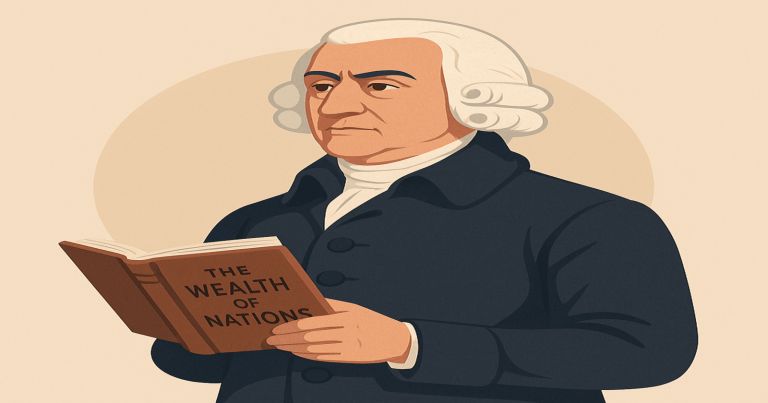Economics studies how people use resources, make choices, and handle money. It tells us how markets grow and how trade works between people, companies, and countries. The person who built the foundation of this subject is Adam Smith. He is called the father of economics. He changed the way the world thinks about money and trade. Adam Smith wrote a famous book called The Wealth of Nations. This book explains how economies grow when people are free to trade and make choices. He believed that people working for their benefit also help others. This idea is known as the “invisible hand.” Smith’s ideas helped shape the world’s first complete theory of how economies work. That is why he is known as the father of economics.
Life of Adam Smith — The Journey of the Father of Economics
Adam Smith’s life story shows us how he became the father of economics. His childhood, education, and travels helped him build new ideas about money, trade, and markets.
Early Life and Learning
Adam Smith was born in 1723 in Kirkcaldy, a small town in Scotland. He was a bright boy who loved to read. He joined the University of Glasgow at the age of 14. He studied moral philosophy there, which helped him understand how people make choices. Later, he went to Oxford University and continued reading books from many great thinkers.
During his study, he learned from famous names like David Hume. His love for books and learning made his thinking very strong. He wanted to know how society and people behave with money and resources.
Teaching and Travel
Adam Smith became a teacher at the University of Glasgow. He taught subjects like logic and moral philosophy. His classes were very popular because he spoke clearly and gave real-life examples. In 1763, he traveled to France with one of his students. There, he met other smart people like Voltaire and Quesnay.
His travels helped him learn more about how different countries trade and grow. He saw how people do business and how rules affect them. These ideas helped him write his famous book later.
Timeline of His Life
- 1723: Born in Scotland
- 1740: Studied at Oxford University
- 1751: Started teaching at Glasgow University
- 1763: Travelled to France
- 1776: Published The Wealth of Nations
- 1790: Died in Edinburgh
Adam Smith’s active life gave him the wisdom to become the father of economics.

The Wealth of Nations — Book That Changed Everything
Adam Smith wrote An Inquiry into the Nature and Causes of the Wealth of Nations in 1776. This book is known simply as The Wealth of Nations. It became the first complete book on economics and changed the world.
What Is Inside the Book?
The book has five parts. It talks about how people make things, how they trade, and how prices work. It also explains how the government should act in the economy.
Smith said that when people try to earn for themselves, they also help others. This is called the “invisible hand.” He also said people should be free to do business without too many rules. He gave many real-life examples to show how markets grow and become strong.
Why the Book Is Important
- The first complete book on economics gave a full view of trade, prices, and money.
- Talked about labor and value: He explained how value comes from work.
- Explained world trade: He showed how all countries can benefit from trading.
- Helped make new rules: His ideas helped countries make better policies.
This book made Adam Smith a world-famous thinker. Students still read it in economics classes today. That is why he is known as the father of economics.
Adam Smith’s Key Ideas — Foundation of Modern Economics
Adam Smith gave many ideas that we still use in today’s economy. His thoughts were simple but powerful. They help us understand how trade, prices, and businesses work.
Division of Labour
Smith said that when people divide work into small parts, it becomes faster and better. For example, in a pin factory, one person cuts the wire, another sharpens it, and another packs it. This way, they can make more pins in less time. This idea helps factories and companies become more productive.
Invisible Hand
This is Smith’s most famous idea. It means that when people do something for their benefit, they also help others. For example, a shopkeeper wants to earn money, so he sells goods. But by doing that, he also helps people buy what they need. This is how markets balance themselves.
Laissez-faire Policy
Smith believed that the government should not control business too much. He said the government should only make laws, protect the country, and build roads and schools. When the market is free, it grows better. This idea is called “laissez-faire,” which means “let it be.”
Free Markets and Competition
He said that open competition makes prices fair and quality better. When many sellers try to sell, they keep prices low and products reasonable. Smith did not like monopolies or cheating. He wanted clear rules but not too many.
Adam Smith’s Impact on Today’s Economy
Adam Smith’s ideas are still used today. His thoughts helped countries and companies shape their economic systems. He showed a better way to grow wealth and help people simultaneously.
Helped Start Capitalism
Smith is called the father of capitalism. He said that when people own things and trade freely, wealth grows. Countries like the USA, UK, and India used their ideas to build their economies. They moved away from too much control to open markets.
Role in Modern Policies
- Education: His theories are part of school and college books.
- Government: Leaders use their ideas to make budgets and tax plans.
- Business: Companies follow self-interest and free trade to grow.
- Trade: Global trade works on Smith’s ideas of open markets.
Criticism of Adam Smith
Adam Smith gave the world new ideas about markets and trade. Many people praised his thoughts. But some people also pointed out problems in his work. His critics said he missed some things or did not explain them well. Even though he is the father of economics, not everyone agrees with all his views.
Lack of Attention to Human Emotions
Critics said Adam Smith focused too much on logic and self-interest. He believed that people always make wise choices for themselves. But in real life, people act based on emotions, fear, love, or habit. Some decisions are not always about money or profit. Smith’s ideas did not fully explain how feelings affect economic choices. Later, economists like John Maynard Keynes talked more about human behavior in economics.
Ignored the Role of Power and Class
Many thinkers said Smith did not explain how power and class affect the economy. He believed in free markets and open competition. However, he did not talk much about how the rich can use power to control markets. Critics like Karl Marx said Smith’s system helps the rich more than the poor. Despite working hard, they told workers they often get low pay, but Smith did not answer these problems.
Too Much Trust in Free Markets
Adam Smith believed markets can fix problems on their own. He talked about the invisible hand that keeps the economy in balance. Critics said this is not always true. Markets sometimes fail. They may cause pollution, cheating, or unfair prices. Smith did not think about what happens when companies cheat, or monopolies take over. Later, economists said governments must step in to fix these market failures.
Overlooked Women and Domestic Work
Many modern scholars said that Adam Smith ignored the role of women in the economy. His book talks about factories, shops, and markets. But he said little about the unpaid work women do at home. Cooking, cleaning, and raising children are also crucial to the economy. Smith’s ideas left these things out. That is why many people say his work is not complete.
No Plan for Economic Crises
Smith gave ideas for how markets grow. But he did not say what to do when markets fall. He did not provide plans for handling recession, unemployment, or inflation. In today’s world, these problems happen often. Modern economists like Keynes gave new ideas for these issues. Smith’s work helped start economics but needed updates on new challenges.
Father of Economics FAQs
Q1. Who is the father of economics?
Adam Smith is known as the father of economics. He gave clear ideas about markets, value, and free trade.
Q2. What is Adam Smith’s most famous book?
His most famous book is The Wealth of Nations. It became the first complete book on economics.
Q3. What does the “invisible hand” mean?
It means people working for their good also help others. This keeps the market balanced.
Q4. Did Adam Smith support government control?
He supported limited control. He wanted the government to build roads, make laws, and protect people.
Q5. How is Adam Smith useful for students?
His ideas help students understand how money and markets work. They are helpful in exams and jobs.
Q6. What is the division of labor?
It means dividing work into smaller steps to make it faster and better. This helps in factories and big tasks.


